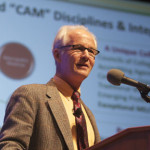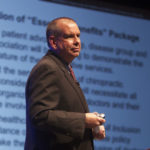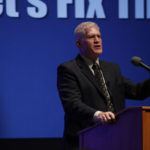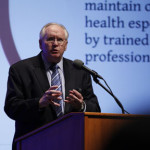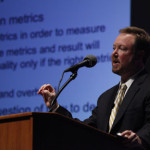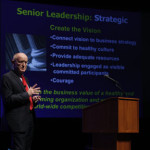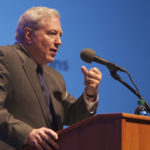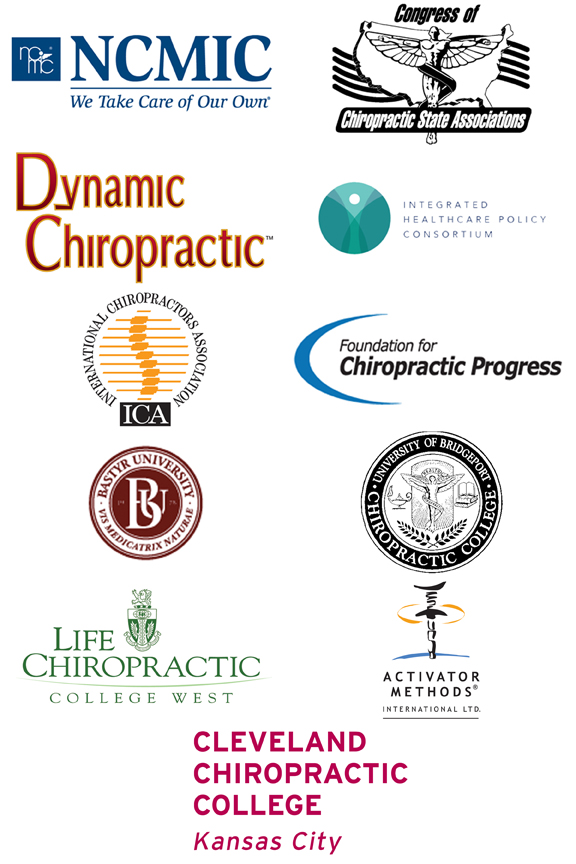
1:00 pm – 1:30 pm Welcome and Overview–Sports Health Science Center, 3rd Floor Auditorium
Guy F. Riekeman, DC, President LIFE University
Gerard W. Clum, DC, Director, LIFE Octagon
1:30 pm – 2:00 pm Conference Introduction
Gerard W. Clum, D.C., Director, The Octagon
2:00 pm – 3:00 pm Dee W. Edington, Ph.D., Professor, Movement Science, University of Michigan

Zero Trends: Wellness As A Goal
A discussion of the needs, past approaches and current strategies to explore how health and well-being can be enhanced in and through the workplace for the best interest of everyone involved.
Director of the University of Michigan Health Management Research Center, D.W. Edington is also a Professor in the Division of Kinesiology at the University of Michigan and a research scientist in the School of Public Health. Trained in mathematics, kinesiology and biochemistry, Dr. Edington received his B.S. and Ph.D. degrees from Michigan State University and completed his M.S. at Florida State University. He taught at the University of Massachusetts before coming to Michigan in 1976. Dr. Edington is the author or co-author of over 500 articles, presentations, and several books, including Biology of Physical Activity, Biological Awareness, Frontiers of Exercise Biology, The One Minute Manager Gets Fit and the 2nd edition, The One Minute Manager Balances Work and Life. Dr. Edington’s teaching and research focus on the relationship between healthy lifestyles, vitality and quality of life, as they benefit both individuals and organizations. He is specifically interested in how individual health promotion, worksite wellness activities and programs within organizations impact health care cost containment, productivity and human resource development. In essence, the HMRC studies the precursors to disease and vitality. Dr. Edington enjoys the constantly emerging challenges at the HMRC. He describes the Center as dynamic, innovative and a world-class leader in driving towards information-driven decision making in the evolving new health care environment.
3:00 pm – 3:30 pm Nutrition Break
3:30 pm – 4:30 pm Andrew Webber, President, National Business Coalition on Health

What Employers Need In Health and Wellness Programs
A consideration of the business community’s expectations of the health care marketplace during this critical period of cost containment and delivery reform and the imperative for change with or without legislative mandates
Andrew Webber is president and CEO of the National Business Coalition on Health (NBCH), a nonprofit, membership organization of nearly 60 employer-based health care coalitions, representing over 7,000 employers and approximately 25 million employees and their dependents across the United States. NBCH is dedicated to improving health and transforming healthcare, community by community. Webber is responsible for overseeing all association activities including value based purchasing programs, government and external relations, educational programs, member communications and technical assistance, and research and evaluation.
Mr. Webber currently is Vice Chair and a Board member of the National Quality Forum (NQF). He sits on the Board of Directors for the Patient Centered Primary Care Collaborative (PCPCC), The Alliance to Make US Healthiest, and the Health Care Incentives Improvement Institute (HCI3) – the combined Bridges to Excellence and Prometheus Payment organizations. He is a Principal of the Quality Alliance Steering Committee (QASC) and NBCH is a member of the Ambulatory Quality Alliance (AQA). Mr. Webber is also a member of the Purchaser/Business Advisory Councils for the National Committee for Quality Assurance, the Joint Commission for the Accreditation of Healthcare Organizations, and the eHealth Initiative.
4:30 pm – 5:00 pm
The Honorable Tom Harkin, U.S. Senator, Iowa (invited to provide videotaped remarks)
The Honorable Johnny Isakson, U.S. Senator, Georgia (videotaped remarks)
5:00 pm – 6:00p Mr. Greg Etzel, Partner, Health Care Group, King & Spalding

Financing Health Care in The New Marketplace
“Mega-trends” in the government finance of healthcare programs and offer comments on the effects that may be seen over the next several years at the individual provider level, including such trends as financial accountability for outcomes, a focus on quality, rationalizing payment rates among providers, expanding coverage and reliance on the market for driving price and quality.
Greg Etzel is a partner in the Healthcare Practice Group. His primary area of practice involves the representation of hospitals and other providers relating to healthcare regulatory matters and payment disputes. His representation includes litigation before administrative law judges and appeals panels such as the Medicare Provider Reimbursement Review Board, the Medicare Departmental Appeals Board, the Texas State Office of Administrative Hearings, and in federal court
Mr. Etzel was listed as one of fourteen “Outstanding Healthcare Litigator” by Nightingale’s Healthcare News in both 2008 and 2009, and was previously named an “Outstanding Young Healthcare Lawyer” by the same publication. The publication highlighted his noted for his work as lead attorney in many federal court decisions favorably reversing an overly restrictive Medicare payment policy. In addition to this honor, Mr. Etzel has been named to the “Best Lawyers in America,” 2008-2010, listed as a “Texas Super Lawyer” in healthcare law by Law & Politics and the publishers of Texas Monthly in 2010, and as a “Texas Rising Star” in 2005-2008.
6:00 pm – 7:30 pm Reception, Socrates Café
8:00 am – 8:30 am Gerard W. Clum, D.C. Sports Health Science Center, 3rd Floor Auditorium
Recap of April 12 and Overview for the day
8:30 am – 9:30 am The Honorable Deborah Senn, Insurance Commissioner, WA (Ret.)

Expanding Access and Choice for your Patients
A Description of How the Affordable Care Act is important to the CAM Practitioner
Deborah Senn served two terms as Washington’s seventh insurance commissioner (1993-2001) and served as the first woman elected to the office. A strong consumer advocate, she was called “the best insurance commissioner in the United states.” Senn is credited with fighting for and creating access to insurance for alternative and complementary providers including naturopathy, massage, chiropractic, and acupuncture.
Former Commissioner Senn is also an attorney and practicing expert in insurance matters: health care, life insurance, long term care, auto, homeowners and pet insurance. Senn is also an international consultant on insurance regulation having traveled to Vietnam, Cambodia, Serbia, Algeria, Kosovo, Bosnia, Paraguay, Armenia and Haiti.
Ms. Senn is also writing a consumer friendly handbook on insurance claims—called 55 Insider Insurance Tips that Will Save You Money.
9:30 am – 10:00 am Ms. Linda Shelton, Partner, Discern Consulting, Baltimore, MD

Health Reform 101-Accountable Care Organization (ACOs)
‘ACO’s: What are they? Why do they matter? How will they affect the delivery of health care in America?
Linda Shelton has worked on the concepts and recognition of the patient-centered medical home since 2002. She led the development of NCQA’s Physician Practice Connections (PPC), the basis for PPC-PCMH recognition, working with the Wagner Chronic Care Model and Bridges to Excellence. At NCQA she also directed all of the NCQA physician recognition programs. As a consultant, she led a demonstration project for eHealth Initiative on care coordination and advised TransforMED on synchronizing its PCMH program with the NCQA requirements, among many other projects. Now as a partner with Discern Consulting, Linda is advising the Maryland PCMH pilot project and the 53 practices enrolled in it.
Linda has served as a speaker and task force participant for many national organizations, including the Care Continuum Alliance, the Institute for Health and Productivity Management, the Health IT Summit and an expert task force for the HHS Agency for Healthcare Research and Quality (AHRQ). She holds a master’s degree in health care administration from The George Washington University.
10:00 am – 10:30 am Nutrition Break
10:30 am – 11:00 am Ms. Linda Shelton, Partner, Discern Consulting, Baltimore, MD
Health Reform 101-The Patient Centered Medical Home (PCMH)
11:00 am – 11:30 am Mr. John Falardeau, Senior Vice President, Government Regulations, American Chiropractic Association
Health Reform 101- The Essential Benefits Package
A discussion of the current approaches being taken toward the establishment and implementation of a “basic benefits package” under the PPACA legislation
 John Falardeau is the Senior Vice President for Government Relations for the American Chiropractic Association located in Arlington Virginia and is responsible for monitoring legislation, formulating policy, and carrying out the overall political strategy for the organization.
John Falardeau is the Senior Vice President for Government Relations for the American Chiropractic Association located in Arlington Virginia and is responsible for monitoring legislation, formulating policy, and carrying out the overall political strategy for the organization.Previously, he was the Director of State Government Affairs for the Rubber Manufacturers Association and spent ten years as a senior aide on Capitol Hill, serving two members of Congress from New York. A U.S. Navy veteran, John received his BS degree from SUNY, College at Brockport, and an MA degree from George Mason University.
11:30 am – 12: 00 Noon Mr. David O’Bryon, J.D. Executive Director, Assn. of Chiropractic Colleges

Health Reform 101- The U.S. Supreme Court Challenges
A review of the three central challenges to the basis and continued implementation of the Patient Protection and Affordable Care Act (PPACA) as expressed before the U.S. Supreme Court, March 2012
David O’Bryon, J.D. has served as Executive Director of the Association of Chiropractic Colleges since 1996. With more than thirty years of association and government experience, he has served organizations as an executive, consultant, and volunteer. His responsibilities have included policy formulation and implementation for associations; design and management of membership recruitment efforts; development and implementation of government relations strategies and public affairs programs; volunteer and staff recruitment; designing, writing and editing communications/publications; and administrative management of budgeting and financial oversight. He registered as a lobbyist before the U.S. Congress in 1980. He has been involved in virtually all the major federal legislative initiatives for the chiropractic profession since that time having started his career working for two members of the United States Congress and has represented the chiropractic profession in Washington, DC for 32 years.
12:00 Noon – 12:30 pm Ms. Laura Carabello Principal, CPR Strategic Communications, Elmwood Park, NJ

Health Reform 101- Value Based Design in Health Benefits
Value-based design as a key element of greater return on investment in health benefits for the patient, the payor and the provider
Laura Carabello is an entrepreneur and strategic marketing consultant extraordinaire having worked with over 1,000 companies and organizations. Her deep and wide-ranging knowledge of international and national healthcare business stems from more than 25 years spent growing business-to-business and direct-to-consumer healthcare and technology companies and playing a critical role in bringing them into the 21st Century.
Laura has been tapped to lead industry consortia and consults to numerous professional and healthcare organizations, including The Cooperative Exchange; Regulatory Harmonization Institute; COPD Foundation; and the Foundation for Chiropractic Progress.
12:30 pm – 1:30 pm Luncheon Sports Health Science Center, 3rd Floor Auditorium
1:30 pm – 2:00 pm Matthew Buettgens, Ph.D., The Urban Institute, Washington, D.C.

Health Reform 101- The Insurance Exchanges
The concept, development, progress and value associated with insurance exchanges as envisioned under the PPACA legislation
Matthew Buettgens, Ph.D., is a Senior Research Associate leading the development of the Urban Institute’s Health Insurance Policy Simulation (HIPSM) model. The model is currently being used to provide technical assistance for health reform implementation in Massachusetts, Missouri, New York, Virginia, and Washington as well as to the federal government. His recent work includes a number of papers analyzing various aspects of national health insurance reform, both nationally and state-by-state. Topics have included state-by-state analysis of changes in health insurance coverage and the remaining uninsured, and the role of the individual mandate, the affordability of coverage under health insurance exchanges, and the implications of age rating for the affordability of coverage. Dr. Buettgens was previously a major developer of the HIRSM model—the predecessor to HIPSM—used in the design of the 2006 roadmap to universal health insurance coverage in the state of Massachusetts.
2:00 pm – 2:30 pm John Weeks, Executive Director, Academic Consortium for Complementary and Alternative Health Care

Health Reform 101- PPACA and the CAM Provider
The seven key areas of interest and concern for all CAM providers under the PPACA legislation
John Weeks has been an organizer-writer-executive in the emerging fields of complementary, alternative and integrative medicine since 1983. Known to many for his policy and leadership-oriented Integrator Blog News & Reports (www.theintegratorblog.com), John helped found the Integrated Healthcare Policy Consortium and subsequently organized and directed IHPC’s National Education Dialogue to Advance Integrated Health Care: Creating Common Ground. This project, involving academic leaders of 12 disciplines (IM, massage therapy, holistic nursing, AOM, ND, DC, direct-entry midwifery, holistic medicine, public health, yoga, occupational medicine, whole person nutrition) led to the development of the Academic Consortium for Complementary and Alternative Health Care. Mr. Weeks has served as the Executive Director of the Consortium since its founding. He has twice received honorary doctorates for his work in advancing integrative health.
2:30 pm – 4:00 pm Clem Bezold, Ph.D., Chairman and Senior Futurist, Institute for Alternative Futures

A View of the Future of Health Care
A futurist’s view of health care in the next decade exploring the impact of the economics of health care, the effect of legislation and changing social attitudes and expectations related to health and well-being on patients, providers and the system itself
Clement Bezold is chairman and senior futurist, at the Institute for Alternative Futures. Dr. Bezold established IAF in 1977 and in 1982 he started IAF’s for-profit subsidiary, Alternative Futures Associates, to assist corporations in their strategic planning using futures methods. He has been a major developer of foresight techniques, applying futures research and strategic planning methods in both the public and private sectors. As a consultant, Dr. Bezold has worked with many Fortune 500 companies along with major organizations, including the World Health Organization, the National Institutes of Health, the Rockefeller Foundation, AARP and the American Cancer Society. He has led major projects on the future of chiropractic as well as complementary and alternative medicine.
Dr. Bezold has published numerous books and reports on the future of government, the courts and healthcare. He is a consulting editor of the Journal of Futures Studies and is on the editorial or advisory boards of Technology Forecasting and Social Change, foresight, and World Future Review. Dr. Bezold received his Ph.D. in political science from the University of Florida. He has been assistant director of the Center for Governmental Responsibility at the University of Florida Law School and a Visiting Scholar at the Brookings Institution.
4:00 pm – 4:30 pm Nutrition Break
4:30 pm – 6:00 pm Darren White, D.C. President, WorkSite Wellness, Redmond, WA

Vital Outcomes and Wellness
A real-world, firsthand chiropractic perspective of creating change, promoting health and well-being in the framework of a traditional chiropractic care approach in today’s environment
Dr. Darren White is the Founder and CEO of Worksite Wellness, a full service employee wellness company with a mission to create happy, healthy and productive workforces. He previously served as the Founder and CEO of Clear Chiropractic, a small local chain of Chiropractic offices in the Seattle area. During his time building Chiropractic Wellness Centers he turned his focus on employer groups who were struggling with escalating health claims costs. Dr. White had a unique opportunity to leverage the success he was having with patients in private practice into the hundreds of programs he created for local employer groups in Puget Sound. Noticing the measurable impact, he founded Worksite Wellness. Dr. White received his Doctor of Chiropractic Degree from LIFE University in Marietta, GA.
8:00 am – 8:30 am Gerard W. Clum, D.C. Sports Health Science Center, 3rd Floor Auditorium
Recap of April 12 and Overview for the day
8:30 am – 9:30 am Greg Goode, Director, Center for Health Policy and Leadership, Bastyr University, Kenmore, WA

A Report on the Stakeholders Conference of 2010
A report on the recommendations and action items of the Stakeholder’s Conference convened at Georgetown University by the Integrated Healthcare Policy Consortium, the Institute for Integrated Health and Palmer College of Chiropractic, September 2010
Greg Goode provides leadership and oversight of University-wide strategic planning and annual reporting and serves as the University liaison to local, state and federal government. He is currently working with the president and provost on the Bastyr University California Initiative. Goode is a board member of the national Integrative Healthcare Policy Consortium and the Bothell, Washington, Chamber of Commerce. In 2011, he founded the Center for Health Policy and Leadership at Bastyr University to encourage active participation in public affairs. Prior to joining at the University in 2009, Goode worked as executive assistant to the president for external affairs at Indiana State University and served as a senior legislative aid in Washington, D.C., handling education, transportation and appropriations legislation for two members of Congress.
9:30 am – 10:00 am Nancy Gahles, D.C., CCH

A Report from the National Healthcare Policy Forum
Federal legislation now offers many opportunities for Doctors of Chiropractic and other non-allopathic providers. The IHPC is a leading voice for our interests.
Dr. Nancy Gahles, DC, CCH, RSHom(NA) is President of the National Center for Homeopathy and represents that organization as a Partner for Health Board member to Integrative Healthcare Policy Consortium. She is currently serving as Interim Chair of the Federal Policy Committee.
Dr. Gahles has a family chiropractic practice and consults, lectures and writes on integrative healthcare as CEO and Pres. of Health & Harmony Wellness Education and TeleHealth and Harmony.
10:00 am – 10:30 am Nutrition Break
10:30 am – 11:30 am Kevin Goodno, J.D., LL.M.

A View from the State Level
A discussion of the challenges and opportunities that are before state professional societies representing the CAM community and a review of strategies to maximize the value of key elements of the PPACA legislation on a local level.
Kevin Goodno has extensive experience in state and local government with particular focus on health care and tax policy. Appointed commissioner of Minnesota’s largest agency, the Department of Human Services, by Governor Tim Pawlenty, he served on the Governor’s Health Cabinet to develop ways to inform, partner, and create efficiency in the health care industry. Before joining the Department of Human Services, he served in the Minnesota House of Representatives for twelve years representing the Moorhead area. He also served on the Moorhead City Council where he participated as a planning commission member working on zoning and land use issues.
Kevin’s private sector experience includes practicing law with a Moorhead law firm where he concentrated his practice on business law including business formation, entity selection, and business planning. Before becoming an attorney, Kevin owned and operated a retail business, giving him first hand knowledge of the issues his corporate clients face.
11:30 am – 11:45 am Gerard W. Clum, D.C. , Director, The Octagon
Introduction to break-out sessions
Two breakout sessions with multiple groups in each session are planned. Attendees are encouraged to register for the break-out groups of your preference. We will attempt to keep an equal number of participants in each group, as a result you may not be assigned to the group of your choice. We will appreciate your cooperation in this regard. You will be able to access the group registration at www.lifeoctagon.org after the conference begins. Attendees will also have the opportunity to register for a group on Friday, April 13, 2012.
Following the conclusion of the Octagon 2012 Conference the Octagon Forums will be available at www.lifeoctagon.org for continued dialogue and input to these questions. These forums will remain open for 60-90 days depending on traffic and interest and they will continue to inform the questions being posed. Access to the forums may be limited to Octagon attendees and online participants.
11:45 am – 12:30 pm Break-out Session #1
Overview Premise: Reimagining Healthcare: Making Health the Goal
The US health care system has focused for years on controlling sickness and disease. We’ve found that this approach is too expensive and fundamentally misses an important reality: we are all intrinsically capable of health, wellness and great action about our own needs. Efforts to reform the current system are generally being based on several conclusions that have come out of many discussions and studies:
1. The delivery of health care services needs to focus on promoting our natural state of health and wellness
2. Payment to providers has to be based on supporting health first, not just controlling disease
3. New pressures on providers to define their value as they participate in the changing health care system ask questions that are often difficult to answer
The federal legislation that has accelerated all this faces a number of challenges, but many aspects of the law are being implemented by payers, employers and providers without waiting for the challenges to be resolved. At the Octagon, we want to help create a kind of road map that multiple stakeholders can use to align their interests. At the end of the day, we all want the same thing: a health care system that delivers good outcomes at a reasonable price, served by providers who are the best sources of the services, and used by a consuming public that is engaged with their own personal responsibility for being–and staying–well.
What we know is that all this requires a re-thinking of the very paradigm our health care system is based on.
To that end, we ask our speakers and conference participants to address several basic questions as we work to create this new document: Vital Health: Road Map to a Healthy System:
Group A. What does it mean to promote health? What should be promoted? What priority should the effort be assigned by different stakeholders?
Group B. What are some aspects of an economically sustainable system? What should costs be based on for consumers and employers? What should payments to providers be based on? Is ‘risk’ part of a new social contract that needs to be established?
Group C. How important is it to be able to describe the value any provider group brings to the health care system? Is value based on scope of practice legislation? Is value based on outcomes, cost, or some other measure? Should ‘value’ be described in standardized terms that apply to all involved?
12:30 pm – 1:30 pm Luncheon (We encourage you to stay with your break-out session one group and to continue the dialogue of break-out session one over lunch)
1:30 pm – 2:30 pm Break-out session #2
Overview premise: PPACA Legislation Challenges Health Care Providers In New Ways
The implementation of many details of the PPACA legislation and the general development of the CAM professions causes questions of professional identity and role to be questioned and evaluated. We ask the participants to offer their reflections on the following questions:
Group A. Do you believe there is room for a vitalistically oriented provider to contribute in the framework of the discussions of the past two days? If so, what is needed for the best possible contribution from your discipline, If not, why not and what could be changed to make it possible?
Group B. Does integration require an alteration of your scope of practice? Does collaboration and cooperation necessarily imply assimilation?
Group C. Is a primary care role, as envisioned under the PPACA framework, possible for the non-drug, non-surgical CAM provider?
2:30 pm – 3:00 pm Nutrition Break
3:00 pm – 3:30 pm Feedback from break-out sessions
3:30 pm – 4:00 pm Gerard W. Clum, D.C., Director, The Octagon
Recap and summary
4:00 pm – 5:00 pm Gerard W. Clum, D.C., Director, The Octagon







